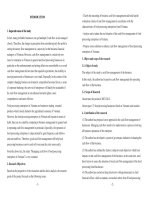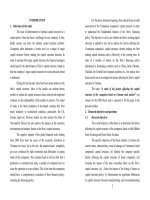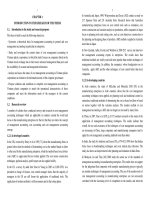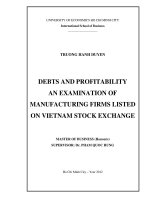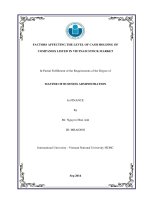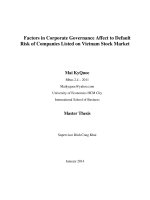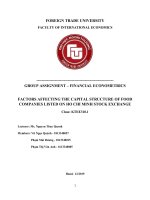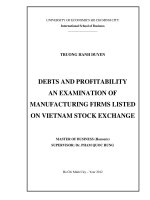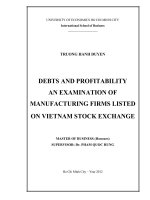A study of the factors affecting the capital structure of the companies listed on vietnam stock market
Bạn đang xem bản rút gọn của tài liệu. Xem và tải ngay bản đầy đủ của tài liệu tại đây (237.26 KB, 12 trang )
INTRODUCTION
1. Relevance of the study
The issue of determination of optimal capital structure at a
certain point of time has been a challenge for any company. In fact,
hardly anyone can solve the optimal capital structure problem.
Companies often determine a certain level (or a range) of target
capital structure before making the capital structure decision. In
order to estimate this target capital structure, the financial managers
should specify the determinants of firm’s capital structure, based on
that the company’s target capital structure for each particular period
is estimated.
During the last decades, there have been many studies on the
firm’s capital structure. Most of the studies use modern theory
models to explain the capital structure choice and provide empirical
evidence on the explainability of the models in practice. The object
of study is the listed companies in developed countries that have
much similarity in institutional condition, particularly the US,
Europe, Japan etc. Previous studies not only analyze the effect of
firm-specific factors, but also explore the impacts of the economic
environment and industry factors on the firm’s capital structure.
The negative impacts of the global financial crisis starting
from 2008 have been the cause of the economic slowdown in
Vietnam ever since. Up to the now, the situation hasn’t completely
got over, evidenced by high inventories and difficulties in raising
funds of the companies. This situation leads to the fact that firm’s
production is contracted and sunk, a number of companies have to
cease the operation or even collapse. This is the time that companies
should have a comprehensive evaluation of their financial policy,
including the financing policy.
2
For the above metioned meaning, there should be am overall
assessment of the Vietnamese companies’ capital structure in order
to understand the fundamental features of the firm’s financing
policy. The objective is not to see whether the firm’s existing capital
structure is optimal or not, but to analyze the factors affecting the
Vietnamese companies’ capital structure, thereby helping the firm
making capital structure policy effectively in the coming time. In
spite of a number of studies on the firm’s financing policy
undertaken in developing countries such as China, India, Pakistan,
Thailand, the Central East European countries etc., few studies have
been carried out to investigate the factors affecting the firm’s capital
structure in Vietnam.
The topic “A study of the factors affecting the capital
structure of the companies listed on Vietnam stock market” was
chosen for this PhD thesis and is expected to fill the gaps in the
previous studies.
2. Research objectives and questions
2.1. Research objectives
The overall objective of the thesis is to determine the factors
affecting the capital structure of the companies listed on HoChiMinh
Stock Exchange and Hanoi Stock Exchane.
The specific objectives of the thesis include: (i) Analyse the
current status, characteristics, trend of changes in Vietnamese listed
companies’ capital structure, (ii) Identify the company specific
factors affecting the capital structure of listed companies; (iii)
Evaluate the impact of the state ownership factor on the firm’s
capital structure; (iv) Assess the impact of the listing of shares on
capital structure policy; (v) Demonstrate the significant differences
in capital structure between manufactoring and non-manufactoring
3
industries; (vi) Analyse the impact of managerial factors of the
Vietnamese companies on the capital structure; (vii) Propose the
solutions for the companies and recommendations to the government
and regulatory bodies to improve the capital structure of listed
companies in Vietnam.
2.2. Research questions
In order to achieve the seven research objectives mentioned
above, the thesis focuses on answering the following five research
questions: (i) What are the main features of capital structure of
Vietnam listed companies?; (ii) Can the Vietnamese companies’
capital structure be explained by the capital structure theories?; (iii)
How does the state ownership affect the capital structure policy?;
(iv) How does the share listing affect the firm’s capital structure?; (v)
Does the companies in manufactoring industries use more debt and
others? (vi) How does companies adjust their capital structure policy
since the global financial crisis; (vii) Beside the factors indentified
by the theories, how does the managerial factors affect the firm’s
capital structure?
3. Object and scope of the research
3.1. Object of the research
Object of the thesis is the firm’s capital structure and factors
affecting capital structure of the companies listed on the Vietnam
stock market. The listed companies are chosen as object of the study
because they represent the companies across different industries,
sectors in the economy and have the best environment to implement
the financial policy.
3.2. Scope of the research
3.2.1. From the geographical aspect
4
The thesis focuses on investigating factors affecting the
capital structure of the companies listed on HoChiMinh Stock
Exchange and Hanoi Stock Exchange.
3.2.2. From the timeline aspect
The thesis analyses the impact of factors on the listed
companies’ capital structure over the last 6 years. The secondary data
was collected for the period from 2007 to 2012. Besides, the thesis
also uses primary data collected from a survey of financial policy of
Vietnamse companies conducted in 2013.
4. Structure of the thesis
In addition to the introduction, conclusion, table of content,
list of acronyms, list of tables, list of figures, list of references and
appendix, the thesis is structured into 4 chapters as follows:
Chapter 1: Theoretical framework and literature review of
factors affecting company’s capital structure
Chapter 2: Research methodology
Chapter 3: Overview of listed companies and status of
capital structure of listed companies in Vietnam
Chapter 4: Analysis of factors affecting capital structure of
listed companies in Vietnam
Chapter 5: Solutions and recommendations to improve
capital structure of listed companies in Vietnam
5. New contribution of the thesis
The thesis has new contribution to the literature of the
factors affecting the capital structure of listed companies from both
theoretical and practical perspectives, specifically:
From the theoretical perspective:
Previous studies mostly focus on the financing policy of
companies in developed countries. Recently, researchers tend to
5
expand the topic to the companies in developing countries, ussually
in big economies such as China, India, Thailand or transitional
countries in Central East Europe. In general, the research results are
inconsitent. Due to the limitation in data collection, there still few
studies on firm’s capital structure policy are undertaken in Vietnam,
Most of these studies uses the financial data of listed companies over
a short time period. This thesis expect to provide an addtional
empirical evidence on the capital structure policy of Vietnamese
companies, using both financial and non-financial data collected
from the listed company database and primary source of data
collected through company survey. In addition, the research model
also supplements dummy variables that allow to evaluate the capital
structure of companies with different ownership structures, stock
trading exchanges, business sectors, evaluate changes in the
companies’ capital structure before and after the financial crisis. The
thesis also analyses the impact of the managerial factors, including
management strategy, psychology, human resources and relationship
network, which few earlier studies in developing countries account
for.
From the practical perspective:
This thesis provides an overall assessment on the financing
policy of the listed companies in Vietnam, thereby allowing the
policy maker to indentify the type of companies that need to be
supported by the government, seeking for the solutions to help
companies undertaking their financing policy more effectively.
6
CHAPTER 1
THEORETICAL FRAMEWORK AND LITERATURE
REVIEW OF FACTORS AFFECTING COMPANY’S
CAPITAL STRUCTURE
1.1. Basic concept of capital structure
1.1.1. Company’s source of capital
1.1.1.1. Borrowings
1.1.1.2. Owner’s equities
1.1.2. Company’s capital structure
1.1.2.1. Definition
Stephen A. Ross, Randolph W. Westerfield and Bradford D.
Jordan (2003) in “Fundamental of Corporate Finance” states that the
firm’s capital structure or financial leverage is the specific mixture
of debt and equity that the firm uses to finance its business
operation.
1.1.2.2. Capital structure measurement
a. Company’s capital structure measures
b. The book value based and market based capital structure
1.1.2.3. Optimal capital structure
The optimal capital structure is the mix of debt and equity
that minimize the firm’s cost of capital, thereby maximizing its value.
The company’s capital structure, however, is affected by a
number of factors which are not easy to indentify. Therefore,
determination of optimal capital structure at a specific point of time
is still a challenge for companies as well as researchers. In fact it is
difficult to estimate a specific optimal capital structure and
companies ussually estimate a range of optimal capital structure
called target capital structure, based on that they make the capital
7
struture policy. At a certain point of time, a company has its own
target capital structure level and the target level may change from
time to time.
1.1.2.4. Factors affecting the company’s capital structure
a. Company specific factors
b. Industry factors
c. Economic environment factors
1.2. Capital structure theories
1.2.1. Modigliani and Miller’s Capital Theory (M&M)
1.2.2. Trade-off Theory
1.2.3. Agency Costs Theory
1.2.4. Signalling Theory
1.2.5. Pecking Order Theory
1.2.5. Market-timing Theory
1.3. Literature review of factors affecting capital structure
1.3.1. Review of empirical studies around the world
1.3.2. Review of empirical studies in Vietnam
CHAPTER 2
RESEARCH METHODOLOGY
2.1. Research design
8
Diagram 2.1: Analytical framework
Source: Author
2.2. Empirical testing of impact of firm-specific factors on
capital structure
2.2.1. Hypothesis development
(1) Factors relating to M&M Theory (1963) and Trade-off
Theory
(2) Factors relating to Agency Cost
(3) Influences of other factors
2.2.2. Data and sample
To test for the impact of the aboved mentioned factors on the
the capital structure of listed companies, the thesis uses balanced
panel data of companies listed on HoChiMinh Stock Exchange and
Hanoi Stock Exchange during the period from 2007 to 2012. These
companies are at different asset size, operating in different
businesses, and therefore are able to represent the whole companies
Secondary analysis
of firm-level data
In-depth interview
Company survey
Verification of
existing findings
Development of
survey instrument
Factors affecting
capital structure as
predicted by
financial theories
Empirical testing
of the impact of
managerial factors
on capital structure
9
in the economy. The total research sample is 193 non-financial
companies (including 90 listed on the Hanoi Stock Exchange and
103 listed on the HoChiMinh Stock Exchange) from 2007 to 2012.
2.2.3. Research model
Regression model: Based on the research questions, the
thesis use a multiple linear regression model described as follows:
y
it
= α
i
+ β
j
X
jit
+ γ
1
GOV + δ
1
FLOOR + λ
1
MANU +
∆
1
YEARDUM + ɛ
it
Model variables
Dependent variable is financial leverage measured by three
debt ratios: total debt ratio, long-term debt ratio and short-term debt
ratio. Explanatory variables include effective tax rate, non-debt tax
shield, bankrupcy risk, business scale, profitability, asset tangibility,
business growth, liquidity, state ownership dummy, stock exchange
dummy, industry dummy and year of observation dummy.
Estimation method
Pooled Ordinary Least Square- Pooled OLS
Fixed Effects Model-FEM
Random Effects Model-REM
2.2.4. Descriptive statistics and correlation matrix
2.3. Empirical testing of the impact of the managerial factors
on capital structure
2.3.1. Research hypothesis
(1) Factors relating to management strategy
(2) Factors relating to psychology
(3) Factors relating to human resources
(4) Factors relating to relationship network
2.3.2. Data and sample
10
Data are collected through online survey questionare. Of the
500 email sent, 112 are responded, however 52 of the responded
results are excluded as the respondents are in unlisted companies, the
remaining 60 responses are valid.
2.3.3. Research model and variables
The analytical method used is the ordinary least square
(OLS) for cross sectional data, the estimation function is as follows:
y
i
= α
i
+ β
j
X
i
+ ɛ
it
The explained variables are also measured by: total debt,
long-term debt ration and short-term debt ratio; explanatory variables
include the management variables and controlling variables.
2.3.4. Descriptive statistics
CHAPTER 3
OVERVIEW OF LISTED COMPANIES AND STATUS OF
CAPITAL STRUCTURE OF LISTED COMPANIES IN
VIETNAM
3.1. Overview of listed companies in Vietnam
3.1.1. Company reform and stock market development in
Vietnam
3.1.1.1. Company reform in Vietnam
The process of state-owned company reform has experienced
the phases of history and achieved a lot of positive outcomes of
which the most noted one is the synchoronous formation of
regulation system creating legal framework for renovating,
rearranging and restructuring of state-owned companies as well as
renovating of the government’s controlling mechanism at state-
owned companies.
3.1.1.2. Stock market development in Vietnam
11
a. Equity market
After 13 years of establishment and development, Vietnam’s
stock market has achieved significant growth rate. The stock market
growth has created a channel for medium and long-term fund
mobilization in addition to the traditional form such as bank credit
and commercial credit.
b. Bond market
The Vietnam’s bond market is still immature and small in
size, with total market capitalization account for 15% GDP. The
liquidity is low and the secondary market is inactive.
3.1.2. Features of listing companies
Listing the shares on stock exchanges allows the companies
to be able to raise long-term fund at lower cost, however the listed
companies must satisfy the information disclosure obligation to
ensure that the investors are provided with sufficient, precise and
updated information relating to the business operation of the
companies as well as the changes that may affect the share price.
Besides, the corporate governance requirements and standards for
listed companies are more stringent than that for non-listed
companies, the issue of internal control and external supervision of
listed companies is also highly regulated.
3.1.3. Overview of listed companies in Vietnam
a. The number and scale of listed companies
At the end of 2013, the number of listed companies in
Vietnam’s stock market is 678, operating in different areas of
business, with total market capitalization of 946 trillions dong,
equivalent to 31% of GDP.
b. Ownership structure
12
Local institutional and individual investors are the major
shareholders of the listed companies, holding approximately 78.19%
of total number of shares outstanding. The government’s ownership
is quite significant (14.05%); foreign investors hold nearly 7.78% of
the total number of listed companies’ shares.
c. Operating results
The operating results in recent years indicate a positive
signal of the economic recovery leading to the improved business
performance of the listed companies.
3.2. The capital structure of Vietnamese listed companies
3.2.1. The status of fundraising structure of listed companies
Statistics show that, compared to listed companies around
the world, Vietnamese listed companies use relatively high debt ratio
with total liabilities account for 55% of the firm’s total assets, of
which debt account from 34-36%. It should be noted that most of the
debt used by non-financial companies are short-term debt.
Statistics on capital structure by sectors show different
fundraising structure across different areas of business. Companies in
the fields of industrials, basic material, comsumer goods, real estate
have highest debt ratio, whereas health care, comsummer service
companies have the lowest level of financial leverage. For all the
industries, short-term debt dorminates in total debt.
3.2.2. Evaluation of fundraising structure of listed companies
3.2.2.1. Advantages
First, listed companies are able to diversify their sources of
fundraising and have more flexibility in raising funds. Second, listed
companies can raise funds at lower cost than that of the non-listed
companies.
13
3.2.2.2 Drawbacks and reasons
Firstly, compared to other companies around the world,
Vietnamese listed companies currently have high debt ratio;
Secondly,most of company’s borrowings are bank loans, which are
short-term and unstable, affecting the company’s long-term
investment plan. Thirdly,fundraising activities are basically
irrational, not completely based on the company’s fund uses demand.
The above mentioned drawbacks are caused by the following
reasons: First, our economy heavily relies on the banking system
which is estimated to account for 80% of total assets of the whole
financial system, the remainder are shared by the securities market,
insurance companies etc. Second, the bond market is still immature
and unattractive to the investors, therefore, doesn’t play the
significant role in medium and long-term fundraising for the the
listed companies through debt instrument issuance. Third, though
stock market has experienced impressive development, the market is
still highly volatile and of low liquidity, especially after the big drop
since the global financial crisis. Fourth, due to the rapid increase in
the number of listed companies and the rapid growth of the stock
market attracted attention, the market contains certain problems
when it faces difficulties such as the listed company’s corporate
governance, information disclosure and risk management.
CHAPTER 4
ANALYSIS OF FACTORS AFFECTING CAPITAL
STRUCTURE OF LISTED COMPANIES IN VIETNAM
4.1. Testing of factors affecting capital structure
4.1.1. Testing of impact of company specific factors on capital
structure
14
4.1.1.1. Choosing the estimated models: OLS, FEM and REM
The Breusch and Pagan Lagrangian multiplier (LM test)
shows that the Pooled OLS model is unsuitable. The Hausman test
indicates that, for all the regression models of the three dependent
variables, the Fixed Effect Model (FEM) is more efficient than the
Random Effect Model (REM).
4.1.1.2. Tests for model specification
Multicollinearity check
Results of this test show that VIF associated with all the
variables are less than 5. Therefore, there is little evidence of
multicollinearity between variables.
Serial correlation check
Using the Lagram- Multiplier test to check the serial
correlation for panel data, the results indicate the existence of serial
correlation in all the three models.
Cross-sectional dependence check
The Pasaran CD test is employed to check whether the
residuals are correlated in the FEM. The testing results do recognize
the cross-sectional dependence problem in all the three models.
Hetroskedasticity check
The Modifed Wald test is implemented to check the
hetroskedasticity problem on the FEM and it is evidenced that there
exists the hetroskedasticity problem in all the three models.
4.1.1.3. Regression results
This section presents the robust standard error estimates (by
fixing the model mispecification problems) for the fixed effect
models with depedent variables of total leverage (LEV), long-term
leverage (LLEV) and short-term leverage (SLEV) using STATA 11
software.
15
4.1.1.4. Robustness check of the results
Regression without the non-debt tax shield variable (ndts)
Regression without the bankrupcy risk variable (zscore)
Regression with interactive variables
Basically, the estimation results support the findings from
the initial model although the magnitude of the coefficients is
slightly different.
4.1.2. Testing of impact of managerial factors on capital
structure
This section presents the estimation results of the OLS
regression model with dependent varibales of total leverage (LEV),
long-term leverage (LLEV) and short-term leverage (SLEV).
4.2. Anslysis of the factors affecting capital structure
Table 4.12: Summary of analysis results
Factors Sign of
impact
Notes
Sign of impact agrees with proposed hypothesis
Size (+)
Profitability (-)
Bankrupcy risk (-) For long-term debt only
The value of collateral (+) For short-term debt only
Liquidity (-) For short-term debt only
The manager’s profit
maximization objective
(+) For short-term debt only
The manager’s risk prospensity (+)
Management experience (+)
Network tie with banks (+) For long-term debt only
Network tie with other companies (+) For short-term debt only
Sign of impact disagrees with proposed hypothesis
Business growth (+)
Stock exchange (-) For short-term debt only
Source: Stata Regression output
First, empirical results of analysis on factors affecting the
capital structure is quite consistent with that of other research
undertaken in other countries around the world, however, the
16
explanatory power of the modern finance theory for capital structure
policy of Vietnamese listed companies is limited due to the fact that
the capital structure of companies in Vietnam is remarkably different
from those in developed countries in that the short-term financing is
dorminated and the the long-term debt is substantially low.
- The trade-off theory is unable to explain the capital
structure policy of listed companies in Vietnam.
- The pecking-order theory partly explains the listed
company’s capital structure, unlike the traditional pecking-order
theory, the priority order when the listed companies raise funds is
retained earnings- equities-debt.
- The listed companiess capital structure is affected by the
assymetric information between the companies and the lenders
(commercial banks).
Second, the state-owned companies are loosing their
advantages over companies owned by other economic sectors in
accessing bank loans.
Third, there is little evidence that more stringent listing
standards help to improve the long-term fundraising of the
companies listed on the stock exchange.
Fourth, the capital structure policy is also affected by the
managerial factors such as the company’s profit maximization
objective, manager’s risk prospensity, manager’s experience and the
network tie between the company and the bank and other companies.
4.3. Policy and managerial implication
Policy implication:
- The government and regulatory bodies must be aware of
the importance of supporting the listed companies to improve their
ability to access to formal sources of capital.
17
- The government should speed up the process of
rearranging, reorganizing, renovating, developing and increasing the
operation efficiency of the privatized companies to improve their
fund mobilization.
- This study also implies the necessity of strengthening
listed companies’ information disclosure regulation.
- The stock exchanges should be restructured in the coming
time to support the listed companies’ fundraising.
Managerial implication:
- First, managers must be aware of the fact that, in order to
minimize the cost of capital, companies should improve corporate
transparency and build reliability of the public by satisfying
information disclosure requirement.
- Companies should evaluate the impact of the risk aversion
on firm’s business growth and development. Based on the nature of
the area of business to decide whether they should maintain their risk
attitude and how the risk aversion may affect the company’s
survival. This is especially important to the companies operating in
the fast growing and intensively competitive industries.
- Companies should be aware of the benefit and importance
of building a wide and strong network tie with lenders, business
partners when they make capital structure dicision.
CHAPTER 5
SOLUTION AND RECOMMENDATION TO IMPROVE
CAPITAL STRUCTURE OF LISTED COMPANIES IN
VIETNAM
5.1. Advantages and distadvantages to capital structure
decision making
18
5.1.1. Advantages
(1) The macroeconomic condition has been stable since
2012, evidenced by the stability of price index, interest rate
indicators.
(2) The banking system becoming more and more stable
with higher liquidity and lower risk.
(3) The stock market restructuring process has achieved
certain outcomes.
5.1.2. Disadvantages
First, the government still holds a significant influence in a
number of listed companies.
Second, the state-owned commercial banks account for more
than 50% of the credit market share, bank loans largely flow to the
big companies that have good relatioship with banks, the credit
product is not diversified.
Third, individual investors are the major participant, whereas
institutional investors play a limited role on the securities market.
Fourth, the insufficient and limited legal framework causes
difficulties and problems to fundraising activities.
Fifth, the lack of normativenes in financial management in
Vietnamese listed companies may affect their capital structure
decision making.
5.2. Solutions to improve capital structure of listed companies
5.2.1. Applying capital structure decision making model
19
Diagram 5.1. Capital structure decision making model
Source: Author
The thesis develops a model that can be used as a guideline
for making capital structure decision of listed companies in Vietnam.
This model is built based on the results of multi-dimentional analysis
of the factors affacting the capital structure of listed companies in
previous chapters.
5.2.2. Establishing a division responsible for capital
management
5.2.3. Diversifying the sources of fundraising and building
strong credit network tie
5.2.4. Improving accounting system and information disclosure
process
First, the listed companies should organize its accounting
division suitable to its management structure. In addition, companies
Factors affecting
the willingness to
use debt
Factors affecting
the demand to use
debt
Factors affecting
the ability to raise
debt
Capital structure
decisions
Profitability
Psychology: risk
prospensity, control aversion
Human resources:
management experience
Asymmetric information:
size, asset tangibility,
growth…
Management strategy:
growth/ profit maximization
Network tie
20
should apply information technology in management, using
accounting softwares to update daily data to ensure quick and
timerly data accessibility.
Second, beside the financial statement format as required in
Vietnamese Accounting Standard, the listed companies should more
clearly explained the “sensitive” indicators on the notes of the
financial statement.
Third, the listed companies should norminate information
disclosure personel or secretary devision responsible for the
following up of the company’s information disclosure rather than
assign the chief accountants, chief finance officer or member of
board of management to be in charge of this job.
5.2.5. Improving the quality of corporate governance
- Increase the awareness of the importance of a sound
corporate governance principles.
- Establish the company’s own corporate governance and
management standard.
- Strengthen the role of controlling board and internal
auditing division.
- Strengthen the cooperation among the boad of
management, the controlling board, the chief finance officer and the
accounting division in making financial decision in general, capital
structure decision in specific.
5.3. Recommendation to the government and regulatory
authorities
5.3.1. Improving the legal framework that regulates
fundraising activities of the listed companies
- Draft on amended Corporate Law should supplement the
following issues : (1) Amend the regulation on joint stock company’s
21
capital to include a detail, clear and consistent definition of joint
stock company’s capital; supplement basic concepts of joint stock
company’s capital, including charter capital and authorized share
capital; (2) Supplement current regulation on joint stock company’s
private placement to make it more simple and applicable; (3)
Supplement regulation to protect the right of minor shareholders.
- The government should have a decision to accept under the
par value share issuance as soon as possible.
- The responsible authorities should closely control the
listed company’s fundraising activities with more stringent
information disclosure requirement and supervise the company’s
usage of funds etc.
5.3.2. Pushing ahead financial liberalization
- Continue to liberalize the operation of financial institutions
on financial market.
- Speed up the process of commercial bank restructuring to
exploit financial potential of the economy.
- Accelerate the liberalization of commercial bank’s credit
operation.
5.3.3. Accelerating Vietnam’s securities market restructuring
First, strongly upgrade the stock exchange listing standards.
Second, reorganize operation of the stock exchanges.
Third, amend regulations on foreign investment on stock
market.
To stimulate the development of corporate bond market in
the coming time, we should consider the following issues:
First, State Bank of Vietnam should maintain a stable level
of interest rates.
22
Second, the government should quickly issue legal
framework that regulates the operation of the credit rating agency.
5.3.4. Building credit rating system and developing the credit
guarantee programs
The government and local authorities should consider to
establish the rating agency and construct credit guarantee programs
to support companies, especially medium and small ones, in
fundraising. This measure helps to reduce information asymmetric
between the lenders (banks)/investors and companies, therefore
reducing company’s cost of capital.
5.3.5. Speeding up restructuring to improve performance of the
privatized state-owned companies
- The key measure at the time being is to improve the
transparency of the companies’ corporate governance and financial
information.
- The government should continue to reduce its holding in
the companies operating in the areas that state controlling power is
not needed.
- The seperation between ownership function and
management function at state-owned companies is a problem that
needs to be solved in time to come.
5.3.6. Strengthening supervision and sanction of information
disclosure violation
- Clearly define functions, duties of the organizations and
entities responsible for supervision of the listed companies’
information disclosure.
- Create a procedure for strong coorporation between the
entities resposible for the supervision.
- Build the supervising criteria and process.
23
- Establish the mechanism of cheking, verifying information
before dissemination.
- Consider to increase sanction framework to prevent the
taking advantage of information disclosure violation for personal
benefit.
CONCLUSION
Results of the thesis indicate that the capital structure of
companies in Vietnam is remarkably different from those in
developed countries in that the short-term financing is dorminated
and the the long-term debt is substantially low. This difference might
limit the explanatory power of capital structure theory in Vietnam.
Tax shield and bankrupcy cost are not the determinants of the
company’s capital structure. Factors relating to the asymmetric
information between the company and lenders (banks) have a great
impact on the listed company’s capital structure policy. Whereas, the
company’s agency cost of equity does not significantly affect its
capital structure. In addition, the capital structure is also affected by
the company’s managerial factors. Although the analysis results are,
to some extent, consistent with that in other countries, the
explainability of the corporate finance theories for the Vietnamese
listed companies is limited due to the subjective reasons from the
company’s perspective and the objective reasons from the
perspective of the nature of the economic structure in the transitional
period and the status of development of Vietnam’s financial market.
Based on results from the analysis, the thesis has found the
solution to improve capital structure of the listed companies, and
moreover, proposes recommendations to the government and
regulatory authorities to create a favourable setting for the companies
24
to improve their capital structure. On the listed companies’ part, they
should establish a good foundation for financial management to
support the capital structure decision making. Companies should
build their own capital structure decision making model suitable to
their specific condition. Macroeconomic policies by the government
and regulatory authorities should aim at (1) improving the legal
environment of the listed company’s fundraising; (2) developing the
capital markets to provide companies with another channel of
medium and long term capital mobilization and (3) strengthening
corporate transparency to reduce cost of funds.
Due to the limitation of data collection, this thesis measures
the company’s capital structure using accounting based value of the
capital components rather than a market based value. Besides, there
could be other factors that affect the capital structure of the
companies but are still not accounted for in the model. Therefore, a
larger, comprehensive and detailed database is recommended to
design new variables to reflect the effect of other qualitative factors
such as the corporate governance, the institutional and industy
influence. Also, other research methods could be applied that allow a
more detailed evaluation about the capital choice decisions of the
companies in Vietnam.
